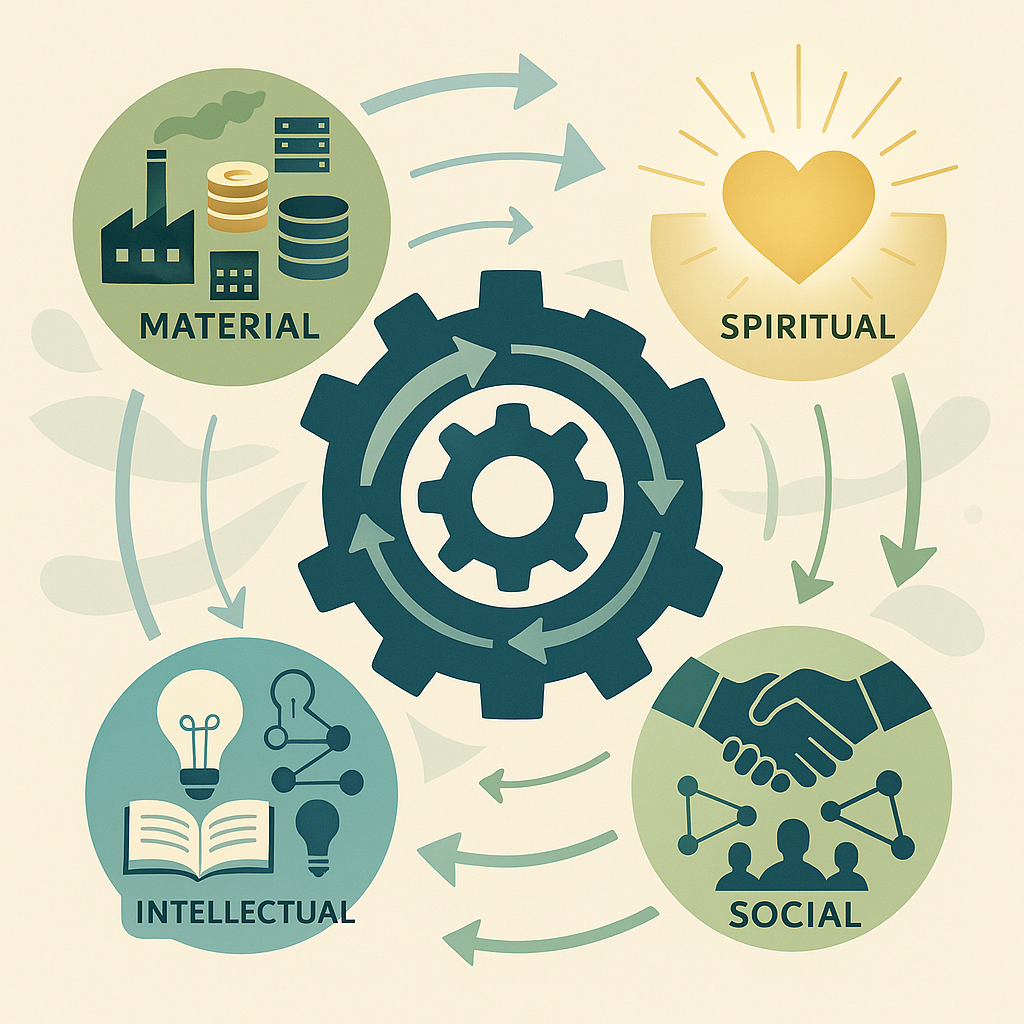|
The Extension of 4Capital Theory
Introduction
The 4Capital Theory, initially conceptualized
by Alex Liu, has evolved from a framework for understanding various
forms of capital to a multi-dimensional tool applicable across
diverse domains. This essay explores its expansion into a
4-dimensional framework for studying humans, organizations, and its
further extension into a 4 Intelligence framework, and its
applicability in AI systems.
4-Dimensional Framework for Studying
Humans and Organizations
The original 4Capital Theory, encompassing
material, intellectual, social, and spiritual capitals, offers a
holistic view of value in both individual and organizational
contexts. Material capital focuses on tangible assets, intellectual
capital on knowledge and innovation, social capital on relationships
and networks, and spiritual capital on ethics and values.
 Extending this theory, we can analyze
organizations in a 4-dimensional manner. The material dimension
assesses financial health and resources, the intellectual dimension
evaluates innovation and knowledge, the social dimension explores
relationships and brand value, and the spiritual dimension looks at
organizational ethics and culture. This approach enables a
comprehensive understanding of an organization's dynamics,
ecosystem, and the human aspects within it. Extending this theory, we can analyze
organizations in a 4-dimensional manner. The material dimension
assesses financial health and resources, the intellectual dimension
evaluates innovation and knowledge, the social dimension explores
relationships and brand value, and the spiritual dimension looks at
organizational ethics and culture. This approach enables a
comprehensive understanding of an organization's dynamics,
ecosystem, and the human aspects within it.
4 Intelligence Framework
The theory's extension into a "4 Intelligence
Theory" encompasses material intelligence (understanding of physics
and eco-knowledge), intellectual intelligence (traditional IQ),
social intelligence (EQ, focusing on emotional and relational
aspects), and spiritual intelligence (SQ, emphasizing ethical and
moral understanding). This framework acknowledges the multifaceted
nature of intelligence, underscoring the need for a balanced
development of various intelligences in educational and
organizational settings.
Application in AI Systems
Dr. Alex Liu's extension of the 4Capital
framework to AI systems under the "4-Dimensional Approach" offers a
structured and ethical methodology for managing AI assistants. This
approach aligns AI capabilities with human oversight across the four
dimensions: material (providing resources and infrastructure),
intellectual (developing adaptive and learning algorithms), social
(enhancing AI's understanding of human emotions and social
contexts), and spiritual (embedding ethical guidelines and values in
AI decision-making). Monitoring and evaluation across these
dimensions ensure that AI systems remain efficient, innovative,
socially aware, and ethically aligned.
Conclusion
The extension of the 4Capital Theory into a
multi-dimensional framework offers a versatile and comprehensive
tool for understanding and optimizing human capabilities,
organizational dynamics, and the development of AI systems. It
promotes a balanced approach that values material resources,
intellectual growth, social connections, and spiritual ethics. This
holistic perspective is crucial for fostering responsible,
sustainable, and ethical development in various spheres of human
activity, including the rapidly evolving field of artificial
intelligence.
|